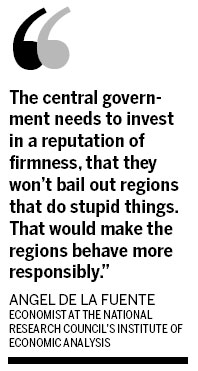Spanish debt fight to focus on regions
Updated: 2011-11-03 07:58
(China Daily)
|
|||||||||
Lawmakers to overhaul government finances to lower borrowing costs
MADRID - Spanish regions, cited by rating companies as a risk to the nation's finances, may face the deepest overhaul since their creation three decades ago as the People's Party pledges to cull bureaucracy and slash spending.
The opposition PP, set to win its biggest-ever majority in Nov 20 elections, will create a "new model of administration" to avoid overlap between local, regional, and central governments, according to its electoral program published on Tuesday.
The party led by Mariano Rajoy would revamp regions' funding system, encourage public-private partnerships and aim to regain the top credit rating Spain lost in the debt crisis.
"If you don't solve this, everything else is impossible," said Jaime Garcia-Legaz, secretary general of Faes, a research institute linked to the PP, and a former Treasury official. "We've created regional leviathans" and "you have to do this if you want to get back to balanced budgets".
Spain's regions control health and education spending, and their failure to meet budget targets has spurred downgrades of their own ratings and of the central government's.
Moody's Investors Service said it had "serious concerns" about the regions on Oct 18, when it knocked Spain's credit rating down two grades to put it on a par with Estonia.
"We will promote a grand pact to start a process of reforms to improve the functioning of public institutions and lay out precisely the responsibilities of the different administrations," the manifesto of the People's Party said.
Borrowing costs
 |
The regions' failure to keep to their budget-cutting schedule has pushed up the central government's borrowing costs as well as their own. Some administrations shut out of wholesale markets now rely on citizens to buy their debt.
Investors demand 375 basis points more to lend to Spain for five years than to Germany, and another 200 basis points to lend to Catalonia, the largest region, according to data compiled by Bloomberg.
The PP would encourage small municipalities to merge and allow regions to sell their public television channels, according to the program. It would define what counts as "basic" health services, which are provided by the regions.
The reordering is part of an effort to stem the surge in borrowing costs as expectations of a Greek default grow, and steer Spain's stagnant economy back to growth to reduce the 22.6 percent jobless rate.
Stricter limits
Faes, the PP-linked research group, went further in a report published in December, saying municipalities with fewer than 10,000 inhabitants could be eliminated, regions could be made larger, and Spain should move to a single tax system.
It proposed stricter limits on borrowing by local and regional governments, or even banning them from doing so.
An overhaul of the regions and their spending "would be welcome", Olaf Penninga, who helps manage 150 billion euros ($205 billion) including Spanish debt at Robeco Groep in Rotterdam, said in a telephone interview. "It would increase efficiency and would be a good area to target for savings."
It would also respond to demands from Spanish businesses.
"Public spending needs to be reduced as well as analyzing the overlap between local, regional and central administrations," Juan-Miguel Villar Mir, chairman of Spanish construction company Obrascon Huarte Lain SA, told reporters on Oct 25.
Golden opportunity
The PP's grip on power at all levels may make it easier for Rajoy to overhaul a system created in 1978 after the death of dictator Francisco Franco that has handed increasing power to regions ever since.
Such support will be a "golden opportunity to make those reforms economic analysts and policymakers have said we should make", Alvaro Nadal, the PP's economy secretary, said in an interview on Oct 25.
"It will make things quite a bit easier," Angel de la Fuente, an economist at the National Research Council's Institute of Economic Analysis, said in a telephone interview.
"The central government needs to invest in a reputation of firmness, that they won't bail out regions that do stupid things. That would make the regions behave more responsibly."
Bloomberg News











